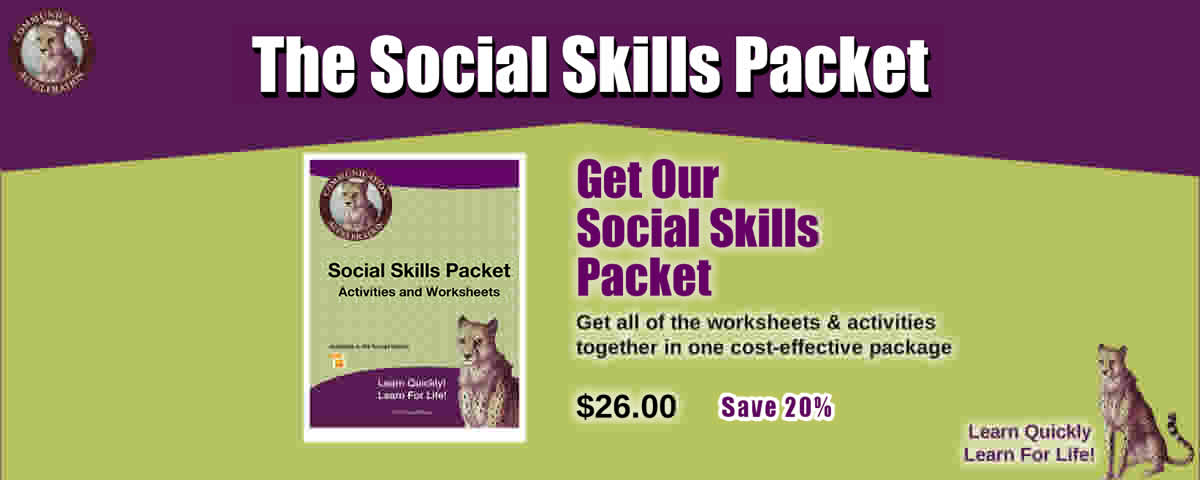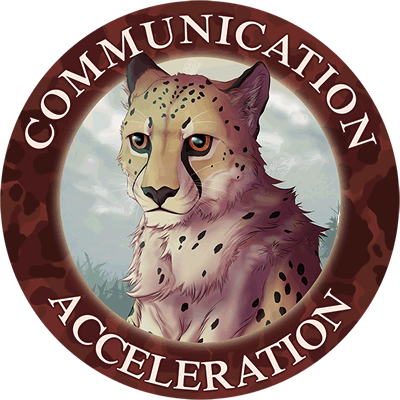Autism Materials -Social Skills Worksheets: Activities Packet PDF
You are here - Social Skills Worksheets Workbook for Autism for Kids - Adults - Printable PDFs for a Social Skills Curriculum

Social Skills Activities Packet
With this packet of thirteen products in their repertoire, speech language pathologists, social workers, psychologists, teachers, and life skill coaches will be able to effectively help their students and clients develop the social skills necessary to function adequately in the social world. The packet begins with a Communication Skills Questionnaire that can start to open your students’ and clients’ eyes to the myriad skills with which they may receive help, while assisting you in choosing goals to target. The next two products, Entering Conversations and Conversational Elaboration, are pretty self-explanatory. I’ve found that these are two of the conversation skills many of my students most want to improve. Polite Wording and Tact help students start to think about others’ and how their wording affects their listeners. Time Sensitivity and Kinesics and Conversation Skills both involve being sensitive to your communicative partner’s time limits, the first by considering the context and the second by observing and interpreting non-verbal signs of interest or disinterest. Editing Verbal Narratives and Speaking to Different Listeners takes listener presupposition to the next level because students must now take into consideration not only their communicative partner’s time limits but also their listener’s interests and needs by adjusting their own content accordingly. At this point, many students are ready for Developing Empathy, which further improves perspective-taking skills and provides closer-to-real-life practice at considering others’ feelings. Complaint Letters: Reader Presupposition is for more advanced students ready to dissect and analyze wording (with lots of examples and support) in terms of its effect on others at a more sophisticated level. The last social skills product in this packet, Perspective Taking, works on generalization of the skills learned by assigning the task of observing and analyzing social interactions in the “real world”, outside of the remediation setting.
Activities Included In The Social Skills Worksheets Packet
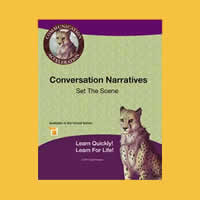
Conversation Narratives Set The Scene
Narratives: Set the Scene is a great tool for teaching individuals with attention deficit disorders, with any impairment of executive skills functioning, or on the autism spectrum how to tell a story in an organized, comprehensive, and communicative partner-friendly manner. So many of my students with A.S.D. or attention deficit disorders have trouble answering simple requests for information, such as “tell me about your summer” or “tell me about your internship experience.” Often, they will start a story without providing any orienting information, such as where they were, who was with them, or when the event took place. Individuals who struggle with theory of mind have a hard time putting themselves in others’ shoes. So when they tell about something that happened to them, they know what happened, and they struggle to understand and keep in mind just what their listener doesn’t already know, and hence needs to know. I created Narratives: Set the Scene to target this skill, and have found that it provides a simple and tangible way for students to keep in mind what information they need to provide to listeners at the start of a verbal narrative and to practice providing that information.
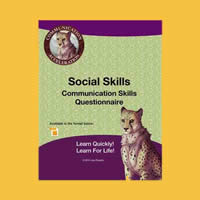
Communication Skills Questionnaire
This questionnaire lets students check which skills they’d like to work on in the following categories: Conversational Skills (examples: picking a good topic, maintaining and shifting eye contact), Practical Skills (examples: asking for help in a store, ordering in a restaurant), Non-Verbal (examples: reading facial expressions and body language, understanding others’ personal space), Dating (examples: asking someone out, choosing an activity), and Conflicts (examples: sticking up for oneself, handling misunderstandings). The questionnaire lets teachers, speech language pathologists, and therapists know which skills are important to individual students, and gives them insight into which skills their students or clients feel they need help with, at the same time increasing their students’ or clients’ self-awareness and providing them with information regarding possible skills on which to focus.
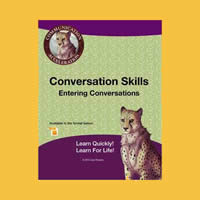
Conversation Skills: Entering Conversations
This handout provides an outline of the behaviors required to enter an on-going conversation, including observation, physical proximity, timing, commenting/questioning, determination of acceptance, and exit strategies. The handout can be used for discussion and/or role-play to help individuals on the autism spectrum improve their conversational skills and knowledge of social dynamics.
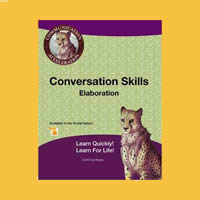
Conversational Skills: Elaboration
This handout provides examples of a range of responses to the same question, leading to a conversation practice activity. These scripted responses clearly demonstrate to individuals on the autism spectrum how elaborated responses lead much more naturally to extended conversation. The handout starts with a written discussion of conversational elaboration and social dynamics.
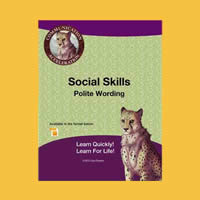
Social Skills: Polite Wording
This straightforward worksheet works on listener presupposition and perspective taking skills. It begins with a written discussion of thinking about your listener before speaking and why it’s important to modify your requests and comments in order to get the best results. It provides examples of polite phrases to add to requests and opinion statements, followed by several sentences for which students can incorporate those phrases. The activity gives students practice at modifying their wording while considering their listeners.
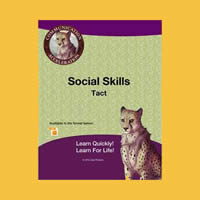
Social Skills: Tact
This handout works on perspective taking and the development of empathy. Individuals on the autism spectrum often struggle with these skills, and this handout helps students understand others’ perspectives and feelings. The twenty-one statements presented contain various tactless sentiments, including bragging, offensiveness, prejudice, inappropriateness, and over-generalization, which can be used for extensive discussion of others’ viewpoints. An answer key is included.
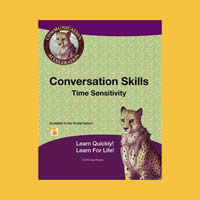
Communication Skills: Time Sensitivity
Following a written discussion on the need to be sensitive to a listener’s time limit, students roll dice to be assigned a hypothetical content (what to say) and context (to whom they are speaking and in what situation). After considering the context, students estimate an appropriate time period, and then practice providing their assigned content within that time period. This social skills activity works on increasing students’ awareness of their listener’s needs (listener presupposition) and improving their ability to limit the time they use to convey their content in order to best fit those needs. We recommend using this product with Kinesics and Conversation Skills and Editing Verbal Narratives, as all three address the need to limit content in order to best suit the needs of communicative partners.
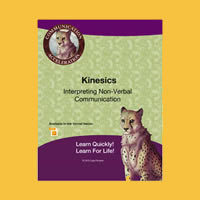
Kinesics and Non-Verbal Communication Examples
This activity is a great resource for teaching kinesics (the ability to accurately interpret non-verbal social cues) and applying that skill to conversations. Many individuals with Asperger’s have difficulty assessing another person’s interest in them. They may approach someone at an inopportune time, or continue talking with someone beyond that person’s inclination to engage. Observation is essential to determining acceptance. Individuals on the autism spectrum do not naturally observe others’ facial expressions, body language, actions, or interactions nearly as often, as attentively, or as effectively as neurotypical individuals do. This social skills activity gives students real-life practice at observing signs of interest versus disinterest from others, helping them to determine whether or not to continue in conversations.
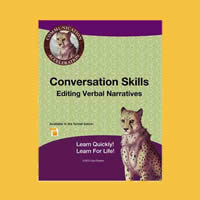
Social Skills: Editing Narratives
These printable worksheets, accompanied by therapeutic notes, help individuals on the autism spectrum improve their conversational skills by increasing their perspective taking ability and listener presupposition awareness. Given a sample verbal narrative in written form, students make decisions to retain or omit sentences and parts of sentences. They are tasked with basing their decisions on their listener’s needs and interests. The therapeutic notes provide comprehensive discussion on why to retain or omit each word, phrase, and sentence. Improved decision-making based on listener presupposition can then generalize into everyday, natural conversations.
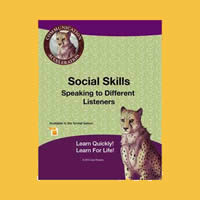
Social Skills: Speaking To Different Listeners
Adjusting to your communicative partner is an important skill with which individuals on the autism spectrum often struggle. Keeping your listeners in mind (listener presupposition) in terms of what information they need or don’t need, and how your words give them a specific impression of you, is essential to successful communication. These worksheets work directly on improving listener presupposition skills. Students write down hypothetical verbal answers to various questions, without knowing to whom they are speaking, and then go back and choose which parts of their answers they would keep or omit, given the identity of their listeners, including a new friend, a job interviewer, a grandparent, etc. Choices made can then be discussed and modified. Three separate printable worksheets ensure improvement of your students’ perspective taking and listener presupposition skills.
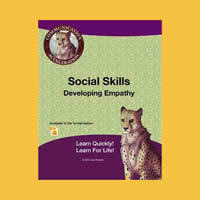
Developing Empathy Worksheets
This activity is unlike any I’ve found available for perspective taking and is one of my very favorites! It addresses the intricacies of writing while keeping your reader in mind and the all-important skill of modifying your wording to give another person a targeted impression of you, all while working on a practical high-level life skill! It combines writing skills and social skills. It begins with an actual complaint letter requesting monetary compensation, extensive therapy notes on how to conduct the activity (including sentence by sentence interpretation of the effectiveness of the complaint letter’s wording), and novel situations from which students must write their own complaint letters. When writing their complaint letters, students are tasked with choosing both content and wording which will give their readers two targeted impressions of them: honest and reasonable. I have watched many of my students notably improve their perspective taking skills to a more sophisticated level from this activity. (Plus teenagers love being given not only permission, but also the expectation, to complain!)
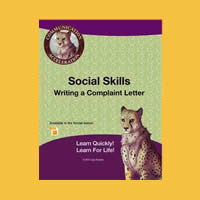
Writing a Complaint Letter (Reader Presupposition & Perspective Taking)
This activity is unlike any I’ve found available for perspective taking and is one of my very favorites! It addresses the intricacies of writing while keeping your reader in mind and the all-important skill of modifying your wording to give another person a targeted impression of you, all while working on a practical high-level life skill! It combines writing skills and social skills. It begins with an actual complaint letter requesting monetary compensation, extensive therapy notes on how to conduct the activity (including sentence by sentence interpretation of the effectiveness of the complaint letter’s wording), and novel situations from which students must write their own complaint letters. When writing their complaint letters, students are tasked with choosing both content and wording which will give their readers two targeted impressions of them: honest and reasonable. I have watched many of my students notably improve their perspective taking skills to a more sophisticated level from this activity. (Plus teenagers love being given not only permission, but also the expectation, to complain!)
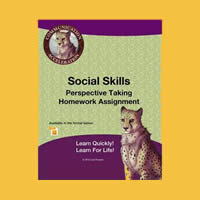
Social Skills: Perspective Taking Homework Assignment
This is a great assignment to give following the Developing Empathy and Conversations activity. It begins with an extensive discussion on helping individuals on the autism spectrum develop perspective taking and empathy, including some of my professional experiences. A homework handout follows, requiring students to observe real-life social interactions and to “put themselves in another’s shoes”. The handout ends by asking what actions the student could have taken to improve a social situation for a person in distress, thereby tying observation and interpretation to troubleshooting and taking action.
